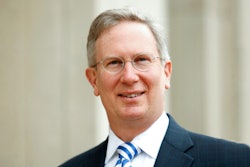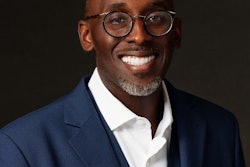Starting Anew
Biding their time in out-of-state teaching positions, New Orleans faculty members are optimistic about a post-Katrina return to the ‘Big Easy’
By Lydia Lum
Not a day goes by that Dr. Jeanine R. Burse doesn’t wonder what she would be doing if she hadn’t been laid off from her job at Xavier University of New Orleans. It was more than a job, and more than a return to her alma mater.
The former assistant professor of biology says the Xavier community was like family to her.
“Xavier was my life,” she says.
Was.
Burse is among the hundreds of higher education faculty who lost their jobs in the aftermath of Hurricane Katrina. New Orleans’ colleges and universities were forced to cancel fall semester classes after the city’s levee system failed, submerging 80 percent of the city just weeks before the academic year began. Damage assessments began evenbefore the deadly storm’s floodwaters had receded, and it wasn’t until the full scope of the destruction was known that university officials could begin the Herculean task of recovery and repair. With most of
their students scattered across the country, tuition for the spring semester was a fraction of its normal amount. Add the enormous costs of repairing the damage from the hurricane, and most of the universities were left with little choice but to trim their faculty ranks.
The situation varies from institution to institution. Even some tenured, senior faculty are jobless, raising some questions over due process. Some have asked whether administrators are using Katrina as an excuse to cut payroll by retaining the least expensive — and generally least experienced — instructors. Officials of the American Association of University Professors have raised doubts over whether faculty were appropriately consulted as to who should stay and who should go, and whether administrators actually exhausted all
other budget-cutting alternatives before they slashed the faculty. University administrators, many of whom spent weeks or months working from remote sites after evacuating the city, have argued that they had neither the time nor the luxury to follow AAUP-recommended practices on such matters.
All of which casts a pall over those faculty who returned to New Orleans. If student enrollment numbers don’t bounce back in the fall, their jobs could disappear next.
“We’re struggling and we’re demoralized,” says Dr. Bill Stewart, an associate professor at Southern University at New Orleans’ School of Social Work. A SUNO spokeswoman says 47 percent of faculty there weren’t retained, including some who were tenured, because only 57 percent of the students returned.
While catastrophes like Katrina can devastate historically Black colleges like SUNO and Xavier, even the private, predominantly White Tulane University didn’t escape unscathed. Despite an $850 million endowment, the university issued termination notices to 166 faculty. Some of those jobs were eliminated immediately; the rest are scheduled to be phased out by the end of the 2007 spring semester. The cuts affected 61 tenured faculty. Perhaps not surprisingly, the axe fell hardest on Tulane’s medical school, as the sharply decreased city population has led to a severe lack of patients.
About one-third of the doctoral programs are marked for elimination, as well as five undergraduate programs, including several in the School of Engineering. Ironically, the region’s flooding has underscored the need for more civil engineers. Yet Tulane officials decided to keep only its “nationally prominent” programs, as well as those programs with potential to reach that level. In the last five years, a total of 32 students have graduated with bachelor’s degrees in civil engineering, says Dr. Lester A. Lefton, provost and senior vice president for academic affairs. Because the majority of Tulane’s students hail from out of state, most of those 32 students left Louisiana after attaining their degrees. By comparison, Tulane graduated more than 200 psychology majors during the same period. “But these cuts are not about our recruitment of students,” Lefton says. “The truth is, it’s about our research strengths. It’s hard for us to compete in some of these areas.”
Faculty citywide understand why such cuts are necessary. However, that doesn’t make swallowing job loss isn’t any easier. As one of 55 faculty members terminated from Xavier, Burse still catches herself saying “us” when referring to the school. She had taught there since 2001, while finishing her doctorate at Tulane. Burse’s voice occasionally breaks while recounting her life since late August. As Katrina barreled toward the Gulf Coast, she and her four-year-old son, Riley, evacuated to Goodman, Miss. Once it became obvious that all of the New Orleans universities would be shut down for the fall, Burse began scouring for work, landing in October at Jackson State University as a visiting faculty member. She is currently teaching a zoology course. A couple of weekends a month, she loads her son into the car for the two-and-a-half hour trip to New Orleans to visit her mother, who’s living in Burse’s apartment in the Uptown section of the city, which was largely spared by Katrina.
While she’s grateful that Jackson State opened its doors to her, she misses her old life. She recalls working alongside former mentors and role models and advising new classes of curious, energetic students. Plus, Burse’s mother, grandmother and other relatives were able to babysit Riley whenever campus meetings ran late. In Jackson, she rents an apartment, “but we have no one but the two of us,” she says.
“I know it was hard for [Xavier president Dr. Norman Francis] to make those cuts,” she says. “I have no ill will. The best experiences of my life are with Xavier.”
At The Crossroads
Like at Tulane and SUNO, some of the faculty released from Xavier were tenured, says Dr. Elizabeth A. Barron, vice president for academic affairs. While no majors or programs have been scaled back, the fact that barely 74 percent of the students who’d enrolled last fall actually returned in January forced the layoffs, she says. But, she adds, a few of the terminated faculty have been re-hired in recent months as students trickle back.
“But we aren’t encouraging anyone to keep false hope. We have helped our former faculty find positions elsewhere. I’ve given letters of recommendation and referred openings elsewhere to them,” she says.
One thing Burse, 32, has been spared, in large part, is paycheck worry.
The Howard Hughes Medical Institute (HHMI) is spending about $3 million to pay this year’s salaries for 58 of the faculty employed by Xavier when the hurricane struck, including Burse. Most of those 58 have returned to the university. Because Xavier has been receiving grants from HHMI since 1988, the institute’s officials wanted to help the school get back on its feet as quickly as possible. They require only that the faculty-beneficiaries pursue scholarly work. Assisted by the $5,800-a-month stipends, the 58 faculty have held visiting positions and affiliations at Spelman College, Stanford University and Texas Tech University, among others. Some taught courses at their new institutions, while others researched or planned future courses for Xavier.
But for other faculty, life since Katrina has been a financial squeeze. Dr. Sonya Caston-Pierre, who was terminated from historically Black Dillard University, estimates she’ll earn less than one-third of what she was scheduled to bring in as an assistant professor of chemistry there. Currently, she’s teaching part time at Jackson State, her alma mater. “I’m glad I don’t have kids or anyone depending on me,” she says. She evacuated to Jackson as the hurricane threatened the coast. Now, she’s living in her parents’ house in Jackson. The home she owns in the Gentilly Woods section of the city must be gutted, after floodwaters rose to 4 feet. In addition to her financial woes, Caston-Pierre must now battle FEMA and insurance adjusters over the house.
The 34-year-old taught at Dillard for a year before Katrina hit. She says she has reason to hope that she will be re-hired for the fall semester. All but 43 full-time faculty were initially laid off from Dillard. But more and more students chose to return after the Hilton Hotel offered to house the students. Dillard officials responded to the increase in students by offering some displaced faculty members their jobs back. Now, according to a spokeswoman, the university has 85 full-time faculty.
But Caston-Pierre has no guarantees. Neither does anyone else.
Dr. Robert A. Waters Jr. had been an associate professor of history at SUNO since 2003. But after Katrina, he had to hustle to find a way to support his family. Waters, his wife, Sarah, and their two young sons, Donald, 3, and Robbie, 1, escaped to a friend’s house, also in Jackson, Miss., as the storm bore down on New Orleans. Their house stood half a mile from the 17th Street Canal and was essentially destroyed when the levees failed. With no home to return to, they pointed their car north and drove to Sarah’s parents’ house in Lima, Ohio. SUNO administrators asked Waters to return to teach, but getting back to Louisiana with such short notice was logistically impossible, so SUNO agreed to offer Waters a leave of absence. With no money coming in, the couple was forced to look for work in Ohio. They found it at Ohio Northern University, a small Methodist school with just over 3,500 students. The university cobbled together history courses for Robert and music classes for Sarah. Combined, they would be considered one full-time employee and be eligible for health insurance.
Coincidentally, Dr. Kendell L. Baker, the president of Ohio Northern, is a survivor of the 1997 Red River flood that devastated Grand Forks, N.D., and East Grand Forks, Minn. “They’ve moved heaven and earth for us here,” says Waters, 45.
Yet things remain very tenuous for the family. Their monthly salary of $2,800 is less than half their pre-hurricane income, which included Sarah’s job teaching percussion at a Catholic school. And even that stops with the end of the academic year. In December, Sarah’s father suffered a stroke. The Waterses rented a house and moved out so that the toddlers wouldn’t impede his recovery.
Waters says it’s possible his job may become another casualty of the hurricane. Many SUNO students, most over the age of 25, lived in the areas of town hardest hit by Katrina. Without the tuition coming in, some programs won’t survive. A SUNO spokeswoman says history is among the 20 programs that have been slated for cancellation.
Amid their own difficulties, Waters and others wonder, and worry, about the future of New Orleans’ historically Black universities. He says many of his students wouldn’t be in college at all if it weren’t for SUNO.
Dr. Linda Carroll, a professor of Italian, has taught at Tulane since 1981. She notices a disturbing trend as New Orleanians begin to return to their homes.
“With the return rate to the city more heavily White than African-American, I’m very concerned about the loss of population,” she says. “The HBCUs cannot pay their employees without tuition coming in. There could be a tremendous infrastructure loss, and the prospect of that makes me very sad.”
Caston-Pierre, meanwhile, wants to do whatever she can to further education opportunities for Black students. She hopes it will be back at Dillard. “Even when I was an undergrad, [Blacks] had to form our own support system. Hopefully, students can identify with my background and realize they, too, can become a Ph.D. if they wish,” she says.
Yet for some faculty, the crossroads at the end of the school year may not include much than a glance at New Orleans. For Burse, who has resumed job-hunting in earnest, the city might already be in the rearview mirror. Depending on what happens, she might return to her New Orleans apartment at semester’s end to continue sending out résumés and making calls. At least there, her mom can help care for her son and she might spend less on daycare. But with so few jobs of any kind in the city, “Maybe this is a calling,” Burse says, “that I need to be somewhere other than New Orleans.
“All I know is, the clock isn’t stopping.”
© Copyright 2005 by DiverseEducation.com


















